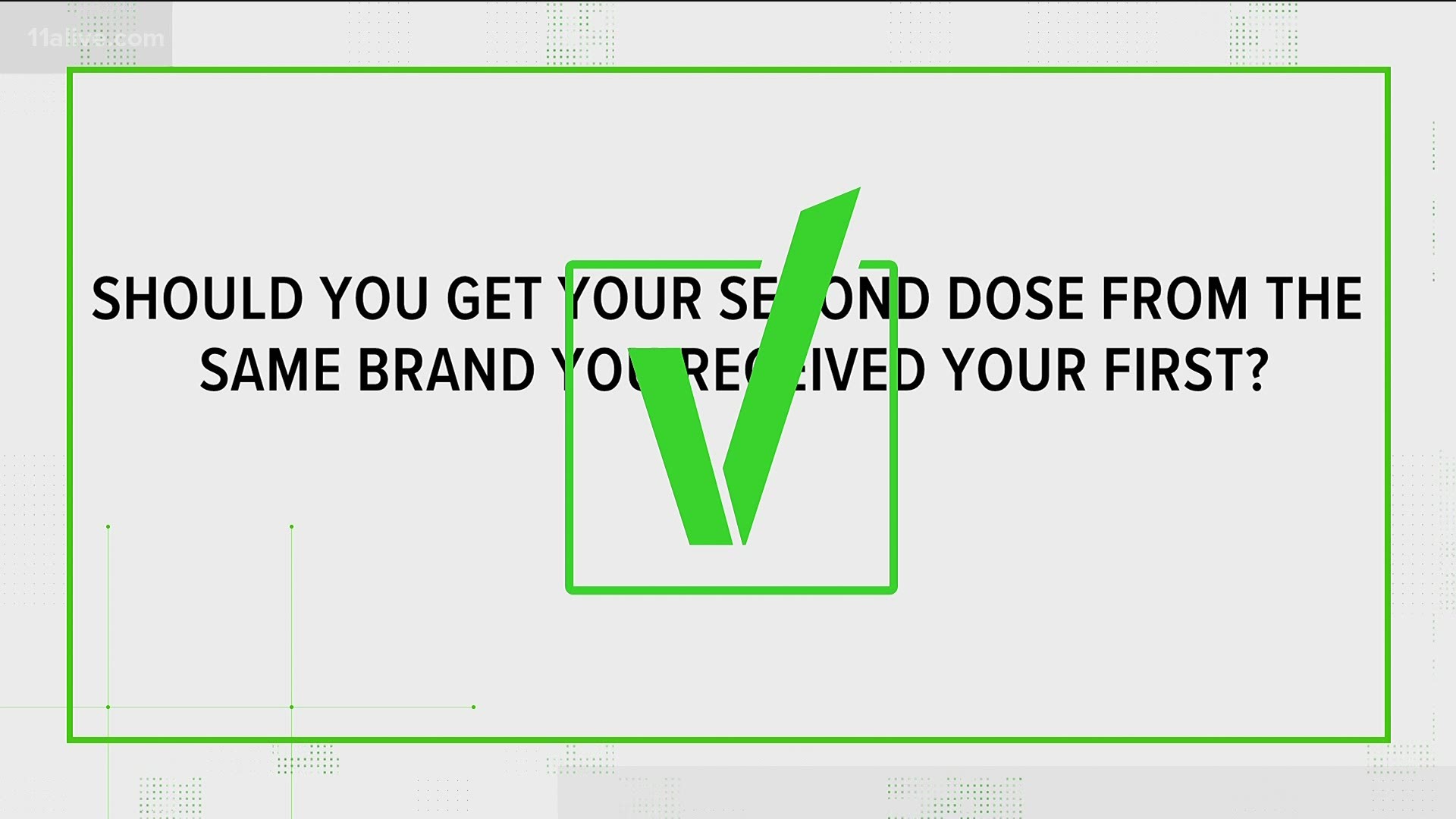ATLANTA — There are now three COVID-19 vaccines approved in the United States. The latest is the Johnson & Johnson vaccine which is only one dose compared to the others that are two doses.
Many viewers have sent us messages asking questions about the timeline of the vaccines and how much they protect someone.
Our Verify team pulled some of the top questions and took them to our experts for answers.
SOURCES:
THE QUESTIONS:
"Should you get your second dose from the same brand you received your first?"
Yes, we can Verify you should stick with the same brand you received your first dose with. So if you received Moderna for the first vaccine, you should get Moderna for the second. Same goes for Pfizer.
Although, Dr. Del Rio says there is a little wiggle room for extreme circumstances.
"Ideally you should get the second vaccine because of a timing issue of the same brand you got the first one. Having said that, the CDC has said that in extraordinary circumstances, if they don’t have one, you can get the other," Dr. Del Rio explained.
"If you started with a two-dose vaccine, could your second dose be a shot that's intended to be a single dose?"
We can't Verify this claim yet. This question has been popping up now that the FDA has authorized the Johnson & Johnson single dose vaccine. But unfortunately, there is no guidance on it yet.
"There's no data for that. The British are doing a little bit of that, but my recommendation at this time is don't do that because we don't have data and if it makes a difference or not," Dr. Del Rio said.
"If you have taken the first coronavirus vaccine and can't find or schedule a second dose in the allotted time, what do you do?"
This is a question we receive often. After getting the first dose, Pfizer advises to get the second after 21 days. Moderna has said 28 days is best for their vaccine.
But what if you can't get the second dose around that time? Dr. Del Rio says you should stick to their timeline, but if that's not an option, you can get it after that recommended time.
"If they say we don’t have anything now but we get it in one week or two weeks that’s okay...Most people think you can easily wait 6 to 12 weeks without any problem," Dr. Del Rio said.
Any longer than that time though, it's a guess until scientists have more data.
So we can Verify, if you have no other choice, waiting 6-12 weeks for your second shot is okay.
"Can vaccinated people still be infected with COVID-19?"
Scientists say they need more data, but believe you can get COVID-19 after being fully vaccinated. The vaccine efficacy ratings are high, but they aren't at 100%. According to the FDA, Pfizer and Moderna have more than a 95% efficacy rating. The new Johnson & Johnson vaccine data says it's over 60% effective.
"Again, we think so. We don't know. We haven't proven it one way or the other," Dr. Del Rio said.
"Do vaccines reduce the effects of COVID-19?"
Scientists may still be waiting on data to see how effective the vaccines are in preventing COVID-19, they agree that the vaccines DO help protect against the effects of the virus.
"That’s one of the things we do know. The vaccine protects you from severe Covid and it protects you from death," Dr. Del Rio explained.
"If you got the vaccine, you no longer have to wear masks or social distance."
This claim is false. You should still wear a mask and social distance to protect yourself and others.
"Because we still don’t know if it protects from infection. Once we know that it will be a different story. But at this point in time, I would still continue to do all the things I was doing before," Dr. Del Rio said.
The CDC agrees, saying "we still don't know if the vaccine will prevent you from spreading the virus...even if you don't get sick yourself."
11Alive's Verify team is here to fact-check claims being shared in the community and online. Fill out the form below with something you'd like us to Verify.

